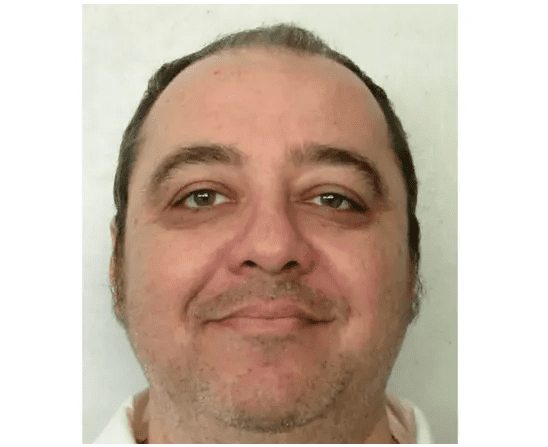In a landmark development, Alabama is set to carry out the first execution in the United States using nitrogen gas, as Kenneth Eugene Smith faces the death penalty after losing last-minute appeals. Smith, 58, convicted in 1989 for the murder of Elizabeth Sennett, failed to secure a reprieve as both the US Supreme Court and a lower appeals court refused to block what his lawyers termed a “cruel and unusual” form of punishment.
Opponents of the nitrogen execution method argue that it could lead to unnecessary suffering, with concerns over potential leaks that might harm individuals present in the execution room. The execution, scheduled for Thursday at 0600 GMT (0100 ET), involves pumping nitrogen gas through a mask, causing the condemned to lose consciousness within seconds and die in a matter of minutes, according to the state of Alabama.
Smith, who has been on death row since 1996, expressed earlier this week that the waiting period felt like torture. His legal team, in a last-ditch effort, lodged another appeal to the nation’s top court in hopes of securing a reprieve.
The use of nitrogen hypoxia has been approved by Alabama and two other US states as an alternative method of execution due to challenges in obtaining lethal injection drugs, contributing to a decline in the use of the death penalty nationwide. Lethal injections have become more difficult to administer, prompting states to explore alternative methods.
Breathing pure nitrogen without oxygen causes cells to break down, leading to death. Alabama contends that the process is humane, expecting the condemned to lose consciousness rapidly. However, medical professionals have criticized the method, warning of potential catastrophic mishaps, including violent convulsions or survival in a vegetative state.
Smith’s case has drawn international attention, with the UN’s High Commissioner for Human Rights stating that gassing Smith could amount to torture or other cruel, inhuman, or degrading treatment, calling for a halt to the execution. Smith’s legal team argued that subjecting convicts to multiple execution attempts violates the Eighth Amendment of the US Constitution, protecting against “cruel and unusual” punishment.
Smith’s past attempt at execution through lethal injection two years ago was unsuccessful as officials were unable to raise a vein before the state’s death warrant expired. His lawyers argue that the nitrogen gas method is “recently released and untested,” leaving him at risk of choking on his own vomit.
Despite the controversy surrounding the execution method, State Attorney General Steve Marshall has deemed nitrogen gas as “perhaps the most humane method of execution ever devised.” Smith’s spiritual adviser, Reverend Jeff Hood, will be present in the execution room, expressing concern about potential nitrogen leaks and the risks involved.
Alabama, known for having one of the highest per capita execution rates in the US, currently has 165 people on death row. The state has faced criticism for three botched attempts at lethal injection since 2018, leading to an internal review that primarily blamed the condemned inmates themselves for the failures.
What is nitrogen hypoxia?
Nitrogen hypoxia is a form of execution in which an inmate is deprived of oxygen until they breath only nitrogen, causing asphyxiation.
Nitrogen, a colorless, odorless gas, makes up about 80% of the air we breathe. It isn’t deadly until it is separated from oxygen.
“What is known is that nitrogen gas, under certain circumstances, can cause death,” said Joel Zivot, an associate professor in anesthesiology at Emory University’s School of Medicine. “But the terms of how it’s going to exactly work is still unclear.”
Smith Execution Chronicles: Lethal Injection Attempts, Legal Battles, and a Glimpse into the 1988 Murder Case
What led to the unsuccessful execution attempt of Smith before Thursday’s scheduled event? In November 2022, an earlier effort to carry out the lethal injection ended in failure when the execution team struggled to locate one of Smith’s veins.
Following a stay from the 11th Circuit Court of Appeals, Smith remained strapped to a gurney for an extended period. Despite the U.S. Supreme Court eventually permitting the execution to proceed, the team faced significant challenges as they attempted to access a vein, resulting in hours of futile needle poking.
This incident marked the second botched execution in the state within two months. In the same month, the execution team encountered similar difficulties in finding a vein for death row inmate Alan Eugene Miller. The execution of Joe Nathan James Jr. faced the same vein-searching issues in July 2022, eventually leading to his death after a three-hour struggle.
These consecutive failures prompted Governor Kay Ivey to halt all capital punishment activities, initiating a comprehensive review of the state’s execution procedures. Capital punishment resumed in July 2023 with the execution of James Barber by lethal injection.
Who is Kenneth Eugene Smith? Convicted in 1988 for the murder of 45-year-old Elizabeth Sennett, Smith received a death sentence in 1996. Despite a jury recommendation of life imprisonment without parole (11-1 vote), a trial judge overruled and imposed the death penalty, as per court documents.
The Rev. Charles Sennett, deeply in debt, orchestrated a plan to collect insurance on his wife’s death by paying Smith and John Forrest Parker $1,000 each. The victim was stabbed eight times in the chest and once on each side of her neck by Smith and Parker. A week later, Charles Sennett died by suicide upon learning of his suspicion in the murder. Parker, also convicted and sentenced to death, was executed by lethal injection in 2010.
What legal obstacles stand in the way of the upcoming execution?
In an effort to prevent Thursday’s scheduled execution, Smith initiated two distinct legal challenges.
One case, presented to the 11th Circuit Court of Appeals, contends that Alabama’s execution plan for Smith carries the risk of inflicting a painful or protracted death. Smith’s attorney, Robert Grass, argued on Friday that the state’s utilization of “untested methods” might lead to extreme suffering or potentially leave Smith in a vegetative state.
Grass emphasized the unprecedented nature of the execution method, stating, “This is the first time this will ever be attempted. There is no data on exactly what’s going to happen and how this will go forward.”
In response, Alabama Solicitor General Edmund LaCour asserted that Smith would quickly lose consciousness and experience no pain during the execution, labeling nitrogen hypoxia as “the most painless and humane method of execution known to man.”
The Alabama Supreme Court recently dismissed a second appeal filed by Smith, arguing that a subsequent execution attempt following the failed lethal injection would constitute cruel and unusual punishment.
Smith’s legal team has submitted a request to the U.S. Supreme Court, seeking a stay on the execution until the case can be reviewed.
[wp_subscription_forms alias=”subscribe_to_get_our_news_updates”]





